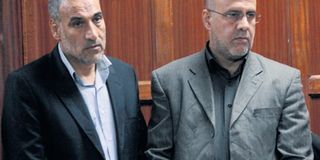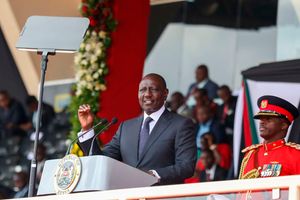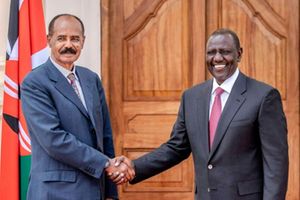Premium
Interpol after an Iranian man whose mission is to free terrorists in Kenya

Iranians Abolfathi Mohammed (left) and Sayeed Mansour who are serving life sentences. Interpol claims there is a plot to free them by any means possible. FILE PHOTO | PAUL WAWERU |
What you need to know:
The two men were detained by Kenyan security forces in June 2012.
Top Kenyan security officials in Nairobi told the Sunday Nation they did not wish to confirm or deny the pursuit.
Interpol is tracking down an Iranian man said to be working under diplomatic cover in Nairobi but whose real mission is to try and free two terrorists sentenced to life imprisonment in Kenya, last year.
An Interpol tracking which has been briefed to top security officials in Nairobi claims that attempts are being made to have the two Iranians released “by all means possible” following the arrest and subsequent imprisonment of the two Qods Force operatives in Kenya in May, last year.
Qods Force is an elite Iranian special forces unit that is one of the most highly trained and highly secretive in the world.
The two convicted terrorists, Ahmad Abolfathi Mohammed, 52, and Sayeed Monsour Mousavi, 53, were sentenced to serve life terms for planning attacks against Western targets in Nairobi and other cities, and for smuggling 15kg of explosives from Iran to Kenya.
The two men were detained by Kenyan security forces in June 2012, on being arrested around Mama Ngina Park in Mombasa with the explosives.
According to the Interpol briefing to top security officials seen by the Sunday Nation, an Iranian who was posted in July this year as a diplomat to Kenya, has been trying to bribe senior officials in Kenyan authorities and legal system, and plotting violent acts — all in order to free the two men of the Iranian Revolutionary Guards.
Top Kenyan security officials in Nairobi told the Sunday Nation they did not wish to confirm or deny the pursuit.
It has, however, been established that the Iranian is himself a Qods Force operative who has been involved in terrorism throughout Africa in recent years, and was sent to the country to free his colleagues by any means possible.
The operative named Mahdi Namehavar arrived in Nairobi on July 13, and accompanied the wives of the prisoners throughout their visit to Kenya, but stayed in the country and continued operating in Kenya after the two women returned to Iran.
Since then, the report says, he is believed to be staying in an apartment in Kileleshwa, and working under diplomatic cover at the Iranian embassy in the city to organise the release of the two terrorists.
'100 PER CENT FAKE'
Contacted by the Sunday Nation, Tehran’s ambassador to Kenya Malik Hussein Givzad termed the report “100 per cent fake”.
In an interview on Saturday, Mr Givzad suggested that it was the work of unnamed plotters out to sour relations between Kenya and Iran.
“All of it is untrue. It’s a plot against our two countries,” the ambassador told the Sunday Nation at the Iranian Embassy in Nairobi.
He said Iran enjoyed good relations with Kenya lasting more than 100 years and his government would not like to jeopardise those relations in any way. “We view Kenyans as equals.”
Mr Givzad then called in four of his officials into the meeting and asked the Sunday Nation journalist who had contacted the embassy to identify the individual named in the report.
“We have not seen his picture,” said the journalist.
The ambassador then asked the officials to join him in the meeting and identified Mr Namehavar.
“This is my political attache,” he said. He stressed that any suggestion that any of his officials was involved in illegal activity could only have been orchestrated by people who wish to strain relations between Kenya and Iran.
Mr Namehavar subsequently said he had worked closely with journalists in his previous postings and looked forward to doing the same in Kenya.
ASSIST FAMILIES
After the two Iranians in jail were convicted of terror, their government pledged to support them in appealing the case.
After the conviction last year, Mr Givzad, said the embassy would help the families of Sayed Mansour Mousav and Ahmad Abolafath Mohammad to appeal after the judgment.
“As an embassy, what we can do is to assist the families of the convicted to seek redress at the High Court, if the lawyers feel that there was no concrete evidence,” Mr Givzad said.
The ambassador added that the case would not sever relations between Kenya and Iran adding that they respected the Kenyan judicial process.
“Iran has cordial business relations with Kenya. This was a judicial process, which we respect,” the ambassador said.
Mr Givzad rejected claims that the Iranian government supports terrorism, saying, if two people are convicted, it does not mean Iran is a terrorist state.
“We know who the terrorists are. Iran has been the target of terror like Kenya,” he said.
But the report seen by the Sunday Nation charges: “Namehavar activities indicate that Qods Force is making every possible effort to free its operatives imprisoned throughout the world, and has no misgivings about pursuing illegal means to achieve this goal: From threats to attempts to offer large bribes to witnesses and officials from the legal and enforcement authorities, with the assistance of influential locals.
“As part of his efforts, Namehavar has met with local terror operatives and criminals, and has been regularly monitoring the movements of the prisoners and their trips outside prison for medical treatment, in order to plan an operation to forcefully free them from prison, in case his efforts to influence the court to accept their plea at the end of the month fail.”
CULTIVATE TIES
The operative now being hunted down is believed to have conducted terror-related activity during the past few years throughout East Africa, in Uganda, South Sudan and Somalia, which he apparently visited as part of his organisation’s efforts to cultivate ties with local armed militias such as Al-Shabaab.
In the spring of 2014, the report says, the operative visited Pretoria, South Africa, and held a series of meetings there, accompanied by another Iranian.
Before his posting to Nairobi, his main base was the Iranian embassy in Dar es Salaam, Tanzania, where he operated under diplomatic cover as second secretary, similar to his current cover.
The two Iranian terrorists — Mohammed and Mousavi — will also serve 15 and 10 years each as additional penalties for being in the country illegally and planning a major terror attack.
Nairobi chief magistrate Kiarie Waweru Kiarie said when he sentenced them last year: “I have taken into consideration their mitigation but on the other hand I shudder at the amount of destruction the 15 kilogrammes of the substance would have caused… according to the police, it was capable of bringing down the Times Tower; it was capable of destroying life and property to unimaginable proportions…”
The magistrate said the convicts “had a purpose for being in Kenya with a substance of mass destruction” and had failed to convince the court what they were doing with the lethal substance.
They have since applied to be released on bond pending appeal but the State has opposed their release and urged the High Court to uphold the penalties.
The duo will know the decision on their application on Tuesday.




